

ACT Scores: Range, Average, What's Good
Your complete guide to 2022 ACT scores, including the scoring range, percentiles and college averages.
ACT Scores 2022: Your Complete Guide
Let's dig into average scores, the scoring range, college averages and more
Let's cover everything you ever wanted to know about ACT scores, including the ACT scores range, percentiles and averages. We'll even take a look at average admitted ACT scores at various popular colleges. Let's jump in.
Table of Contents
1. ACT Scores Introduction
• What is a good ACT score?
• ACT Score Percentiles
• ACT Scores: the Good, the Bad and the Average
• What is a good ACT score for you?
2. College ACT Scores Data
• ACT Scores Range at Select Colleges
• ACT Scores Averages at 50 Popular Universities
• ACT Scores and College Admissions
3. How to Raise Your ACT Score
4. ACT Scores Final Thoughts
5. ACT Scores FAQ
ACT Scores Introduction
The ACT is made up of four sections, and each of those is scored from 1-36. Your composite score is the average of your four scored sections, and those averages do round up. There is also a separate essay that is scored from 1-12. The average composite ACT score is 20.6.
A few other key points:
- The essay may not exist for long, and few colleges require it.
- Calculators are permitted on the ACT Math Test.
- Gaining one point on your composite score typically means gaining four total points from subscores.
A Closer Look
There are 75 questions on the English Test, and you will have 45 minutes to complete the section. The maximum score is 36, and the average score is 19.9. This will be the first section on the ACT, and each question has four answer choices.
The ACT Mathematics Test features 60 questions with a time limit of 60 minutes. The maximum score is 36, and students are allowed to use a calculator. The average score is 20.2, and each question has five answer choices. Questions get harder as you progress through the section, but all questions have equal weight.
The Reading Test features 40 questions across four passages, and the time limit is just 35 minutes. There will be one prose fiction passage, one social science passage, one humanities passage and one natural science passage. Each question has four answer choices, and the average score is 21.2.
The Science Test features 40 questions spread across seven passages. There will be three charts and graphs passages, three experiments passages and one conflicting viewpoints passage. Each questions has four answer choices, and the average score is 20.4.
What would 4 EXTRA POINTS do for you?
We average just under 4 points of improvement, and all of our tutors have scored in the 99th percentile
What is a good ACT score?
A good score gets you into the college you want to attend and gets you a scholarship if you need it. Okay, duh. But what sort of score actually does that? Maybe you’ve taken the test and know your score, or maybe you’re still picking your test date and are trying to make your college shortlist.
Either way, we're about to lay out everything you need to know about ACT scores, including percentiles, the average score at a ton of top colleges and the amount of improvement you might see in your ACT score with some prep.
ACT Score Percentiles Chart
See how your ACT score stacks up against other test takers:
Live Online 1-on-1
Live, online act tutoring with a top 1% tutor.
- Live 1-on-1 sessions
- Same tutor every session
- 99th percentile tutors
- Flexible scheduling
- Magic Pack curriculum
- Homework from official tests
- Unlimited Video Vault access
- Test Prep Essentials
- Customized for your needs
LIVE ONLINE 1-ON-1
Act scores: the good, the bad and the average.
Scores range from 1-36, and the average ACT score in 2020 is 20.6. There are four separate sections, and the average score across these sections actually varies pretty substantially. The average score on the English Test is 19.9; the average score on the Mathematics Test is 20.2; the average score on the Reading Test is 21.2; the average score on the Science Test is 20.6.
Okay, so those are the averages. But what’s a good score? What’s a bad one? What kind of score will make you cry? Those are much tougher questions to answer. A good place to start is a few key score percentiles from our chart above:
- 99th Percentile: 34 A 34 is a really, really high score. It's only two points away from a perfect score, but it's still a feat that is accomplished by 1-in-100 test takers. It's also right around the average score for most Ivy Leaguers, so if you have Ivy ambitions, you better start studying.
- 90th Percentile: 29 This is still an extremely high score (better than 90% of students). It's also pretty close to the average at a lot of competitive colleges that are not Ivy League schools. There are plenty of good schools with lower average scores, so don't fret if a 29 isn't in the ballpark for you.
- 75th Percentile: 24 This is a good score, and it is within striking distance for a student who starts with an average score of 20-21. If you’re sitting at a 24, you’re better off than three out of four students, so even if it isn't a 34 or a 29, it’s still pretty good. This kind of score will make most students competitive at a lot of quality flagship state universities and many private schools. Increasingly, though, top-tier state universities are above this mark.
That gives us a starting point to understand what counts as a good ACT score. But what about a good score for you?
What is a good ACT score for you?
Unfortunately, this question is not an easy one to answer. For most students, their college prospects depend largely on two things:
GPA and class rank
Both of these factors are absolutely huge, and at competitive colleges, both need to be strong. A student with a 34 but a bad GPA is probably an outsider at most Ivy League schools. Similarly, a student with a great GPA but a poor test performance isn’t super competitive at a lot of really competitive universities. Thus, we can’t really talk about bad scores without having the context of GPA.
Instead, we can say this: A bad ACT score is one that is weaker than your GPA.
Okay, that’s kind of a non-answer. But it’s the truth. If you want to go to a top-tier state university like the University of Texas-Austin, a 25 is probably a bad score. However, a 25 might be a great score if you want to go to a lot of other pretty good schools. Many students would be thrilled to have a 25, but others might feel devastated.
Bottom line: The ACT score you need is determined by the college you want to attend.
GET YOUR FREE ACT vs. ACT DIAGNOSTIC TEST NOW!
Make the decision with real data, not hunches. You'll get immediate access, and scoring is automatic.
College ACT Scores Data
Since good ACT scores are determined by target universities, let’s look at what types of colleges have average ACT scores in various ranges:
34+: The best universities in the world, including Harvard, Stanford, Cal Tech, MIT and Princeton.
31-33: Almost-Ivies, like UC-Berkeley, University of Michigan, University of Virginia, UCLA and Notre Dame.
27-30: Tons of good private and public universities, including the University of Texas at Austin, University of Florida, George Washington University and Pepperdine.
25-26: This is probably the most common range for quality state universities, including the University of Colorado, University of Arizona and Texas A&M. There are also many quality private schools in this range, including TCU and Syracuse.
22-24: Broad range of schools, including flagship state universities like the University of Missouri and Ole Miss and quality second-tier state universities like the University of Illinois-Chicago and UC-Riverside.
Below 21: There are actually quite a few universities in this category, including tons of non-flagship state universities and a lot of small private colleges. Some examples include Arkansas State University, University of Colorado at Colorado Springs, Regis University and Illinois State.
What can you gather from this? Three things:
There’s a school to match your ACT score. Quality universities can be found up and down this list, so you’re not destined to a life on the streets if you end up with a 21.
Three points can make a HUGE difference. A 29 can put you at UT-Austin, which is a top-10 public school in America. The 26 can put you at some good schools, but nothing of that caliber.
The best schools are really, really competitive. If you were to line a hundred students up, on average, only one would be seriously competitive at schools in the first group. Even for the second group, only a few students would have a real chance.
ACT scores at competitive universities have gotten really, really high.
ACT Score Data for 50 Popular Universities
Act scores and college admissions.
Like we said above, ACT scores and GPA/class rank make up the vast majority of the admissions calculation. In fact, many schools will use these figures as their initial filter before moving on to further aspects of a student’s application.
For many schools, a great ACT score can help offset a mediocre GPA or class rank. Schools differ in how they weight the various portions of a student’s application, but a less-than-stellar GPA will always look better next to a strong ACT score.
Of course, if you plan on targeting top-tier colleges, you will need a sufficiently high ACT score and GPA. At the most competitive universities, standards are so high that very, very few students are shoo-ins, regardless of their ACT scores and GPA. I’ve known of perfect-scoring students who were rejected at multiple Ivy League schools!
How to Raise Your ACT Score
We have spent thousands and thousands of hours figuring out how to help students do better on this test. There is no one-size-fits-all solution for every student, but there are some things that will work for the vast majority of students. This information isn't a replacement for a comprehensive prep program, but it will be useful to any student looking to raise their ACT score. While you're at it, you might want to check out our Free ACT Prep Guide.
Consistency COUNTS
It's tempting to try to cram for the ACT. But remember that the test covers years of school concepts. It's a ton of material, and you won't be able to get it done in a week and do it justice. So don't try. Instead, start early and make consistent, steady progress.
Most students are surprised at the progress they can make in 6-8 weeks of dedicated prep. Just four or five hours a week for a couple months is enough for most students to significantly improve their academic concept understanding and become confident in the most important test-taking strategies.
Improve Concept Understanding
You hear a lot of people talk about little tricks that can massively raise your score. Don't buy into it. The big gains come from getting better on the actual grammar, algebra, etc. that is tested.
Do Official Practice Tests
There is no substitute for putting in the time, and you should spend this time on official practice tests. The good news is that there are a lot of free official practice tests
Target Weaknesses
Based on your practice test results, you should know where you are weak and where you are strong. Make a list of your biggest weaknesses and move through the relevant content in a methodical way. Rinse and repeat.
Track Progress
A good plan is one that leads you up to a specific test date and also features weekly goals for the amount of time you should spend on prep. Use your practice tests to track your progress toward your goal and determine where this time should be spent.
ACT Scores: Final Thoughts
There is no magic number for what constitutes a great ACT score. Your starting point of reference is your targeted schools list. That will tell you what your goal should be. Once you’ve created your list and looked at the average ACT scores for your target schools, you should have an idea of what kind of score you will need in order to be competitive. If you have a low GPA, you’ll need to be even higher.
To some people, a 25 is a great score. If you’re looking at colleges with an average score of 22, a 25 is fantastic. You’re likely to get in, assuming your GPA is in order. However, that same 25 becomes much less impressive if you are targeting a school with an average ACT score of 32. If they have an average of 32, you have some serious work to do.
Fortunately, scores can improve, and if you’ve made it through this entire post, you might have the commitment needed to get YOUR great ACT score :).
ACT Scores FAQ
Still have questions on how your scores fit into the college admissions puzzle? We'll try to answer them.
Maybe! Different colleges give different weight to scores and GPA. Having a good score but a bad GPA is certainly better than having a bad score and a bad GPA, but how much that bad GPA will hurt your really does depend on the colleges you are considering. Obviously, a good GPA is better than a bad GPA, but there is a good chance you will find some competitive universities that will give significant weight to a great score.
The answer is pretty much the same as the good score/bad GPA question: Maybe. Just as some colleges will give weight to a great score, some will give less weight to ACT scores and more weight to GPA and class rank. There is a limit to this potential, however. The odds of getting into Harvard with a 22 are extremely low, regardless of your GPA. The lesson here is that top colleges expect both high scores and a high GPA. Having one or the other is better than having neither, though.
Most students can raise their scores significantly through consistent hard work. What does "significantly" mean? It means you will be competitive at colleges you are not currently competitive at. Going from a 20 to a 23 is a significant jump, just as going from a 32 to a 34 is a significant jump. That doesn't mean all students will do this, though. The reason is simply that not all students are prepared to put in consistent hard work. A tutor can help with this, but plenty of students can do it on their own.
No. Both tests are standardized, which means they are scored in comparison to other students who take the test. The way ACT scores are compared to ACT scores is through percentiles, and a 50th percentile score on the ACT means you did better than 50% of other test takers -- which is exactly what a 50th percentile score the ACT means. Neither test is easier than the others in general, but there are some considerations that could make one a better pick than the other for you. Request a diagnostic quiz to see which one is right for you.
"Superscore" refers to the practice of taking the highest sub-score for each section across all testings and combining them to make the highest possible test score. For example, if you scored a 25/28/26/25 (English/Math/Reading/Science) on one test date and a 28/26/28/27 on the next, your superscore would be 28/28/28/27. That would give you a 28 composite score, which would be one point higher than your otherwise-best composite score of 27 (your second test). Some colleges do this, some don't. It varies greatly. There are even some colleges that do this for admissions purposes but not for scholarships, and some colleges do the exact opposite. Most schools will state their policy on their website.
No, probably not! Your ACT scores are just one part of your college preparation, and they don't say anything great about you as a person. The biggest indicator of your potential for success in college is your willingness to put in the work. While it is a good idea to get the best score you can, which will allow you to get into the college of your choice, don't fret if you end up with a less-than-stellar score. Plenty of successful people didn't do well on the ACT.
Some students can get meaningfully higher scores by prepping on their own. Some can't. Doing ACT tutoring with a professional prep company has its advantages. You can work more efficiently because the tutor will help you prioritize where to spend time, you can move through the material in an organized, systemic way and the tutor can help you through your content weaknesses, whether those include brushing up on old algebra you haven't done in years or fixing some bad grammar habits. Students who can get the same results on their own usually have a lot of time and no shortage of drive to do it. If this isn't you, or if you need results now, a tutor might be a good option.
No. This is a myth. Because the tests are standardized, there's no advantage to taking one test date over another.

What’s the Difference Between the PSAT and the SAT?
If you’re planning to go to college, you’ve probably heard of College Board, and you’ve probably heard of the standardized exams . . .

10 SAT Mistakes that are Wrecking Your Score – Part 1
As SAT prep experts, we talk a lot about how to raise your test score: getting better at the content that the SAT tests . . .

Complete Guide to SAT Scores, 2022 Edition
Let's talk about SAT scores! We're going to discuss SAT percentiles and talk about what constitutes a good, bad and average . . .

SAT Practice Tests: How to Boost Your Score
Needing a good SAT score can add a lot of pressure to your already hectic high school life. A good score can open endless . . .
What are your chances of acceptance?
Calculate for all schools, your chance of acceptance.
Your chancing factors
Extracurriculars.
Complete Guide to Your ACT Score Report
Do you know how to improve your profile for college applications.
See how your profile ranks among thousands of other students using CollegeVine. Calculate your chances at your dream schools and learn what areas you need to improve right now — it only takes 3 minutes and it's 100% free.
There’s no doubt that the ACT and the SAT are among the most important tests that a high school student takes. As such, it’s imperative that you know how to interpret your scores and glean from them as much information as possible.
The new ACT score reports, most recently modified in September 2016, contain many valuable insights into your performance. By interpreting your results, you can find where to direct your studying for future tests, which academic areas might need reinforcement in school, and even how closely your interests align with your potential college major.
In this post, we will provide an overview of how your ACT is scored, when and how to access your results, and what your detailed score report actually means. We’ll also answer a few potential questions you might have about sending reports or verifying their validity. For more information about ACT results and how you can use them to your advantage, read on.
What Score Do I Need to Get Into a Good College?
While there is no minimum ACT test score required for college admissions, each school has an ideal ACT score range in which they hope applicants will score.
Every school has a different approach to weighting standardized test scores. As a general rule, though, it’s good to fall somewhere in the middle 50% of last year’s accepted students’ score range. The higher you fall in the range (or even beyond it), the better.
The middle 50% is a range almost every college posts somewhere on their admissions page. They plot the scores of all accepted students who took the ACT results for a given class year. If they published all scores, the range would include all kinds of exceptional candidates and not be very useful. So instead, they cut off the 25% highest and lowest scores, publishing the middle 50%.
For example, here are the score ranges from the Top 20 Rated Universities and Top 20 Rated Colleges:
For a good ACT score goal, you should look up the middle 50% ACT score range for schools you hope to attend. If it’s a dream school, aim to fall anywhere in the range. For target schools, shoot for the upper bound of the range. For safety schools, try to earn a score beyond the middle 50% score range. Of course, in all situations, the higher the score, the better.
To get an even better idea of where your score places you, read CollegeVine’s What Is a Good ACT Score?
How is the ACT Scored?
Simply put, your score for each section is calculated by a computer that scans the number of answers you got correct and produces your raw score. Your raw score for each section is then converted into a scaled score, ranging between 1-36, which takes into account very slight differences in difficulty on different forms of the ACT. Basically, it ensures that a specific score indicates the exact same level of mastery across every version of the test.
Next, your scaled scores from 1-36 for each of the four required sections (English, Math, Reading, and Science) are averaged together to create a composite score indicating your overall performance. Your composite score is rounded to the nearest whole number, with decimals less than .5 being rounded down and decimals equal to or greater than .5 being rounded up. This means that you can in fact get a perfect composite score without getting perfect section scores; for example, if you were to score a 36, 34, 36, 36 on each of the sections, your average would be 35.5, which rounds up to 36.
If you take the optional Writing test, your overall score is reported on a range from 2-12. This score is the average of four domain scores also ranging from 2-12. These domain areas are: Ideas and Analysis, Development and Support, Organization, and Language Use and Conventions.
Two trained readers will give you a score from 1-6 in each of the domains. If their scores vary by more than one point, another reader will resolve the discrepancy. Your score for each domain is the total of both readers’ points. The Writing test score is not factored into your composite score, but will be on your score report.
To learn more about the ACT scoring process, check out CollegeVine’s post How Does the Scoring Curve Work for the ACT? .
When Will My Results Be Available?
The exact timeframe for returning score reports varies. Generally, scores will become available sometime between ten days and six weeks after the test. If you took the exam with Writing, your ACT Writing Score is usually available about two weeks after the rest of your scores. For a complete calendar of score release date ranges, see the ACT Score Release Date Calendar .
How Can I Access My Scores?
You can access your Student Report through your online ACT web account . This is the same account that you can use to register for tests online and to access the practice ACT Question of the Day. Your Student Report will include your ACT results along with college and career planning information.
Your High School Report will be delivered to your high school about two to eight weeks after the test date. This will include all of the same information as your Student Report.
What Does My ACT Score Report Mean?
Let’s break down the score report. When you first open it up, you’ll find a page that looks like this one, taken from the ACT’s Interactive Student Report :
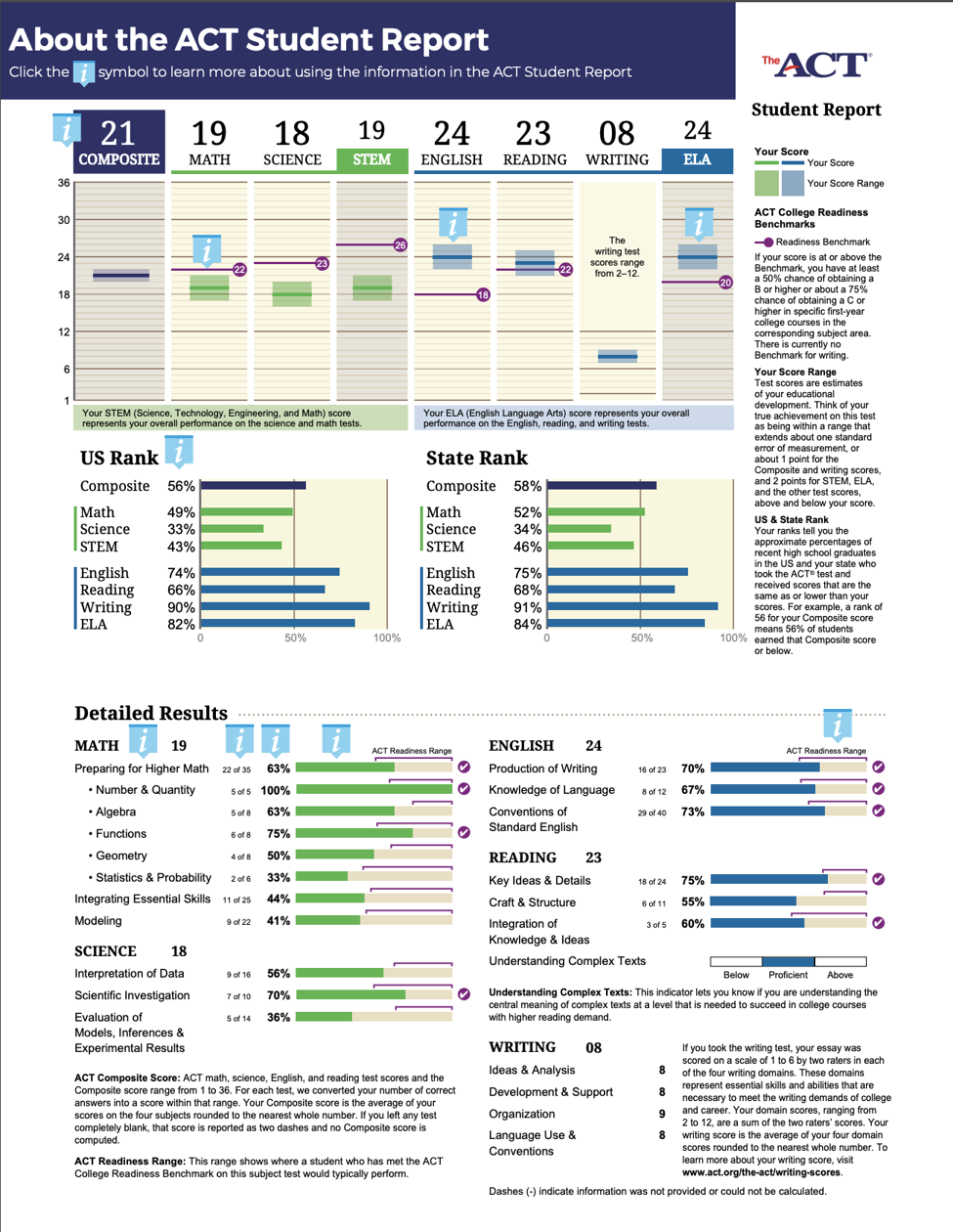
That’s an awful lot of writing and numbers to take in all at once, so let’s look at it piece by piece.
Readiness Benchmarks
The newest benchmark is the STEM Benchmark. It was introduced in late 2015 to provide additional insight on STEM-specific skills assessed through the Math and Science ACT tests.
There is currently no benchmark for ELA or the Writing test.
The STEM Benchmark, at 26, is the highest of all ACT Readiness Benchmarks. This is indicative of the difficulty of the first math and science courses taken by students enrolled as STEM majors as compared to those taken by most other college students. STEM majors can be expected to dive right into college calculus, chemistry, biology, physics, and engineering courses and an ACT STEM score of 26 or higher is associated with a 50% chance of earning a B or higher and about a 75% chance of earning a C or higher in these entry-level STEM courses.

Discover your chances at hundreds of schools
Our free chancing engine takes into account your history, background, test scores, and extracurricular activities to show you your real chances of admission—and how to improve them.
Understanding Your Math Score
The Math Section of the ACT has 60 questions on it and takes 60 minutes. To make scoring for the four main sections similar, your raw score is scaled to a 36-point scale, with 1 being the lowest possible score and 36 being the highest score possible. In the example score report the ACT provides, the student received a scaled Math score of 19:

You will also notice a purple line with a 22 written in it. That’s the ACT College Readiness Benchmark. For each subject, the ACT publishes a score that they recommend if students are to succeed in a college environment. The ACT College Readiness Benchmarks are standards of performance intended to predict a 50% chance of obtaining a B or higher or about a 75% chance of obtaining a C or higher in corresponding first-year college courses.
In the example, the student falls a little bit below the benchmark. This is a good indicator that the student should keep studying to get a higher score. In general, you want all of your score to fall above the ACT College Readiness Benchmarks. Scroll down to “ACT Score Percentiles, or State and National Rankings” to see how the student performed relative to other test-takers.
Decoding Your Science Score

The ACT Science Section contains 40 questions and takes 35 minutes. It too is scaled to a 36-point scale, with 1 being the lowest possible and 36 being the top score. In the sample score report, the student has received an 18. The green shaded region above and below their score line indicates their score range, since the ACT recognizes that a student may be feeling better or worse on any given test day.
The college readiness benchmark for the Science section is 23. If this student is hoping to study Biology, Chemistry, Earth Sciences, Physics, or Astrophysics, then it is a good idea to retest to prove proficiency. Scoring below the benchmark indicates that this student has more high school concepts left to master.
The STEM Score
You may remember from the test layout that the ACT has no STEM Section. Instead, the Math and Science scores are averaged to reveal your STEM subscore.

In the example, the Math score is 19 and the Science score is 18. You would expect the STEM score to be 18.5, but since only whole numbers are allowed, it rounds up to 19. You can jump to the “ACT Score Percentiles, or State and National Rankings” section of this post to see how the student performed relative to other test-takers.
You may notice that the STEM college readiness benchmark is higher than both the Math and Science benchmarks. That is the ACT’s way of letting you know that it helps to excel in at least one of these two sections if you plan on pursuing a STEM career.
Making Sense of Your English Score

The English Section is 45 minutes long, with 75 questions in total. The student in the example earned a 24 out of 36 possible points. This student is well above the benchmark, suggesting that they have an aptitude for English. (You can ignore the blue icon, or visit the interactive student report to learn more about the shaded score range.)
Breaking Down Your Reading Score
Your Reading Section score is based on how you answered 40 Reading questions in the 35 minutes allotted by the ACT.

This student earned 23 of the 36 possible points on this section. That puts their score above the purple line for the college readiness benchmark. If you jump down to the “ACT Score Percentiles, or State and National Rankings” section of this post, you will see that this student performed better than most test-takers for this subject.
However, an admissions committee would not say that this student excelled in Reading because part of their score range falls below the benchmark. To establish Reading as a strength, this student should score well above the college readiness benchmark.
The ELA Score

ELA stands for English Language Arts and refers to your performance on the English and Reading Sections combined. It is also scored out of a possible 36, and its college readiness benchmark is 20. If you want to distinguish yourself as an accomplished lover of the humanities, aim to earn at least a 23 on this section, as that will place your score range well above the benchmark.
How to Interpret Your Writing Score

How you did on the 40-minute, optional writing prompt determines your ACT Writing Score. Unlike the other section, the ACT Writing Score is given on a scale of 2–12 points. Two graders read your essay and give it a grade of 1–6, with 6 being the highest score. The two scores are then added together to give the cumulative ACT Writing Score. Unlike the other sections of the ACT, the Writing section has no college readiness benchmark.
Composite Scores
Now that you understand each section on its own, you can put your Composite Score in context. Your Composite Score is the average of your scores on the four main sections of the test: Math, Science, English, and Reading.
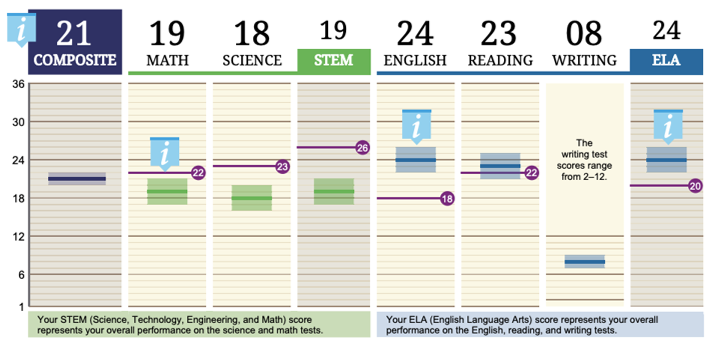
In this example, the composite score is 21 out of a possible 36.
ACT Score Percentiles, or State and National Rankings
Underneath your composite and section scores, you’ll see your ACT score percentiles, written as both national and state rankings:
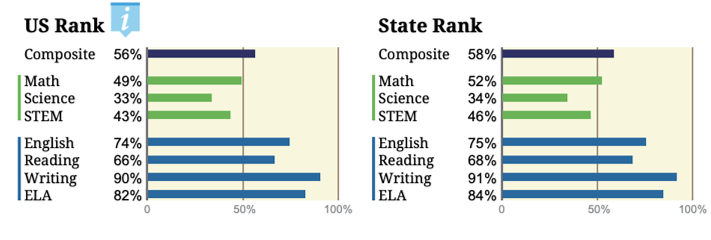
Image courtesy of ACT
These graphs show how your scores compare to those of other test-takers. The bar graph under the US Rank heading on the left shows your ACT score compared to students nationally.
Percentiles are an important metric, as they give you perspective about how your performance stacks up. If your composite score fell in the 56th percentile, as in the example above, that would mean that for every 100 test-takers in the nation, you scored higher than 56 of them. Basically, you scored higher than 56% of other ACT students.
For the state ranking, it appears that this student scored in the 58th ACT score percentile of all test-takers in their state. In this comparison, the student is only being compared to other test-takers in their state, not nationally.
Additionally, there are percentiles for each of the sections the ACT administers, as well as two additional score percentiles for STEM and ELA as umbrella categories. We can see from the graphic that this student is stronger in English Language Arts than Science, Technology, Mathematics, and Engineering because all of their blue ACT score percentiles are higher than their green ones.
Detailed Results
The section following your national and state rankings will show your detailed results. This section has information on your performance within each subject area on more precise skill and content area questions. You can find an example of this section below:
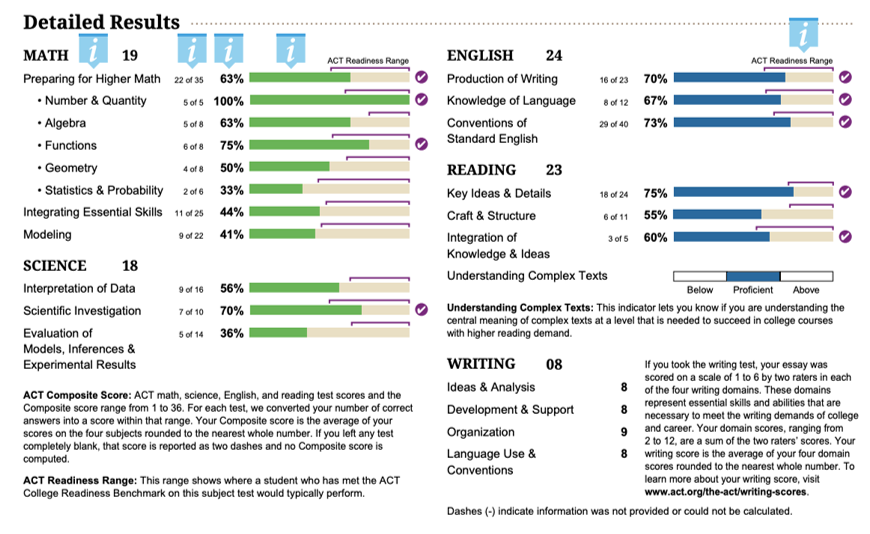
Note that the categories under each section test show subsections of knowledge that are assessed during the test. While questions are not grouped or labeled by their category on the test, each question is categorized by the ACT to fall into one of the subscore categories under each section.
On the Math test, questions fall into the following categories: Preparing for Higher Math, Integrating Essential Skills, and Modeling. The Preparing for Higher Math questions can be further divided into Number & Quantity, Algebra, Functions, Geometry, and Statistics & Probability questions.
On the Science test, questions can be broken down into Interpretation of Data, Scientific Investigation, and Evaluation of Models, Inferences, & Experimental Results.
On the English test, questions can be broken down into Production of Writing, Knowledge of Language, and Conventions of Standard English.
Finally, on the Reading test, questions can be broken down into Key Ideas & Details, Craft & Structure, and Integration of Knowledge & Ideas.
While your percentage of correct questions in each subcategory bears little to no weight on college admissions decisions, it is a great indicator to you of your performance in more specific content areas on the ACT. If you plan to take the test more than once, these subscores should help to shape your studying by highlighting areas in need of further reinforcement.
Next to each of these subscores, you will see your performance as a percentage of questions correct, with the same percentage shown visually on a bar graph. This bar graph will also include a purple bar indicating the ACT Readiness Range. If your performance in each category meets the readiness benchmark, you will see a checkmark to the right of the bar graph.
College and Career Planning
Although there are a few more sections of your score report, the last one that we’re going to discuss in any depth is the College and Career Planning section. The remainder of the score report descriptions are fairly self explanatory or simply outline ACT policies.
The College and Career Planning portion of your score report will look something like this:
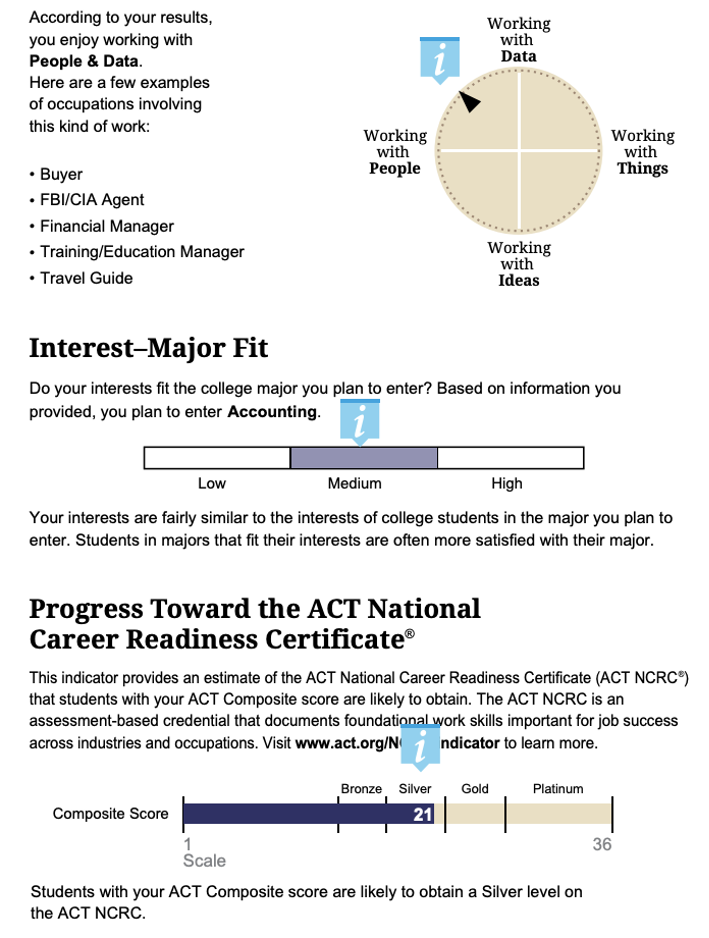
Before you began the ACT, you took an interest inventory that asked questions about the things you enjoy doing or are interested in learning. You were also invited to indicate your intended college major if you had one. On this section of your score report, your interest inventory has been categorized to indicate a general idea of what you like to work with (data, things, ideas or people) and these interests have been used to create a short list of example occupations involving that kind of work.
You will also see an indication of how closely your interests seem to mesh with the major you intend to enter. While for many, high school is quite early to know exactly what career path suits you best, you might be able to use some of this information to help shape your college course selection. For example, if your intended major and your interests don’t seem to align, you might use this information to experiment with classes more attuned to your interests, and see if you think they might provide an alternate career path.
Don’t worry about this section too much, though. It is offered purely for your own reference, and while it is summarized on the score reports that colleges receive, it will not generally receive much attention from admissions committees.
The College and Career Planning section can provide you with some of the earliest insight you’ve probably received about the alignment of your interests with potential career and academic paths. By understanding your ACT score report, you make the most of the information it provides.
To learn more about the ACT test, check out these CollegeVine posts:
- What Is a Good ACT Score?
- ACT vs SAT: Which One Should You Take?
- 13 Tips for ACT Test Day
Want to know how your SAT score/ACT score impacts your chances of acceptance to your dream schools? Our free Chancing Engine will not only help you predict your odds, but also let you know how you stack up against other applicants, and which aspects of your profile to improve. Sign up for your free CollegeVine account today to gain access to our Chancing Engine and get a jumpstart on your college strategy!
Related CollegeVine Blog Posts

US Illinois
Recently viewed courses
Recently viewed.
Find Your Dream School
This site uses various technologies, as described in our Privacy Policy, for personalization, measuring website use/performance, and targeted advertising, which may include storing and sharing information about your site visit with third parties. By continuing to use this website you consent to our Privacy Policy and Terms of Use .
COVID-19 Update: To help students through this crisis, The Princeton Review will continue our "Enroll with Confidence" refund policies. For full details, please click here.
Enter your email to unlock an extra $25 off an SAT or ACT program!
By submitting my email address. i certify that i am 13 years of age or older, agree to recieve marketing email messages from the princeton review, and agree to terms of use., act scoring chart: calculate your score.
ACT scoring doesn't have to be a mystery. Learn how the answers you get right on the ACT translate to your overall score. We'll explain the ACT grading scale and show you a sample ACT score chart.
Is the ACT scored on a curve?

Best 382 Colleges 2018 Edition on TODAY Show
ACT Tips: Pacing and Personal Order of Difficulty

On each section of the ACT , the number of correct answers converts to a scaled score of 1–36. ACT works hard to adjust the grading scale of each test at each administration as necessary to make all scaled scores comparable, smoothing out any differences in level of difficulty across test dates.
There is no truth to any one ACT test date being “easier” than the others, but you can expect to see slight variations in the scale from test to test.
Calculate Your ACT Score
Act raw score vs scale score.
Here’s how ACT scoring works. You’re given a point for every question you get right (there’s no penalty or point deduction for wrong answers). The total number of questions you get right on each test (English, Math, Reading, and Science) equals your raw score . Your raw score for each test is then converted into a scale score (1–36).
Composite Score
Your composite score, or overall ACT score, is the average of your scores on each test. Add up your English, Math, Reading, and Science scores and divide by 4. (Round to the nearest whole number). Learn more about what your ACT scores mean .
Sample ACT Scoring Chart
This is a sample ACT raw score conversion grid from the free test ACT makes available on its website. Keep in mind, the ACT score chart for each test administration is different, so this one should be used only as an example.
Read More: What's a Good ACT Score?
How is the ACT Writing Test scored?
The writing test score is a little more complicated. If you take the ACT Plus Writing (which will ask you to write an essay), your writing will be evaluated by two readers. Both readers score your essay on a scale of 1–6 in four different areas (learn more about the ACT essay here ). The ACT essay score will appear on your score report on a scale from 2-12. ACT also reports an English Language Arts (ELA) score out of 36, which represents your overall performance on the English, reading, and writing tests, but this value is NOT included in your ACT Composite Score calculation. No ELA score is reported if you do not choose to take the ACT With Essay.
Build the right ACT prep plan for you
Our private tutors will help you build a prep plan that's customized to your score goals, study habits, and schedule.
Find a Tutor

Explore Colleges For You
Connect with our featured colleges to find schools that both match your interests and are looking for students like you.

Career Quiz
Take our short quiz to learn which is the right career for you.

Get Started on Athletic Scholarships & Recruiting!
Join athletes who were discovered, recruited & often received scholarships after connecting with NCSA's 42,000 strong network of coaches.

Best 389 Colleges
165,000 students rate everything from their professors to their campus social scene.
SAT Prep Courses
1400+ course, act prep courses, free sat practice test & events, 1-800-2review, free digital sat prep try our self-paced plus program - for free, get a 14 day trial, what would you score on the mcat today.
Thank you! Look for the MCAT Review Guide in your inbox.
I already know my score.
Enrollment Advisor
1-800-2REVIEW (800-273-8439) ext. 1
1-877-LEARN-30
Mon-Fri 9AM-10PM ET
Sat-Sun 9AM-8PM ET
Student Support
1-800-2REVIEW (800-273-8439) ext. 2
Mon-Fri 9AM-9PM ET
Sat-Sun 8:30AM-5PM ET
Partnerships
- Teach or Tutor for Us
College Readiness
International
Advertising
Affiliate/Other
- Enrollment Terms & Conditions
- Accessibility
- Cigna Medical Transparency in Coverage
Register Book
Local Offices: Mon-Fri 9AM-6PM
- SAT Subject Tests
Academic Subjects
- Social Studies
Find the Right College
- College Rankings
- College Advice
- Applying to College
- Financial Aid
School & District Partnerships
- Professional Development
- Advice Articles
- Private Tutoring
- Mobile Apps
- Local Offices
- International Offices
- Work for Us
- Affiliate Program
- Partner with Us
- Advertise with Us
- International Partnerships
- Our Guarantees
- Accessibility – Canada
Privacy Policy | CA Privacy Notice | Do Not Sell or Share My Personal Information | Your Opt-Out Rights | Terms of Use | Site Map
©2024 TPR Education IP Holdings, LLC. All Rights Reserved. The Princeton Review is not affiliated with Princeton University
TPR Education, LLC (doing business as “The Princeton Review”) is controlled by Primavera Holdings Limited, a firm owned by Chinese nationals with a principal place of business in Hong Kong, China.

ACT Percentiles – How to Find ACT Score Percentiles

Your ACT percentile ranking tells you how you did compared to everyone else on the ACT test. ACT percentiles are, in some ways, even more important than your actual ACT score . Why? Because they provide an easy way to compare your performance on the ACT to other test-takers overall, providing you with important information for your ACT prep.
Read on for everything you need to know about ACT score percentiles.
How Are ACT Score Percentiles Calculated?
ACT percentiles are calculated by comparing one ACT score to the distribution of scores of all the students who took the ACT at a given time. On your ACT score report, the lowest percentile possible is the 1st percentile and the top percentile is the 99th percentile (it’s impossible to score at the 100th percentile because that would mean that your ACT score is higher than your score, which makes no sense!).
As a standardized test, the ACT is intentionally designed to get most students scoring at the 50th percentile mark. The following infographic might help you visualize the ACT score distribution:
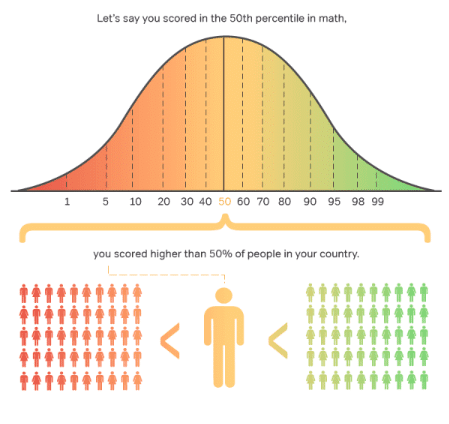
ACT scores and their corresponding percentiles tend to stay the same year to year. So, for example, scoring a 32+ typically means you did better than 97% of test-takers and scoring a 26 typically means that you did better than 82% of test-takers. (Note that these scores don’t mean that you scored a 97% or a 82%, respectively, on the test.)
Historical ACT Composite Score Percentiles
These historical ACT percentiles are provided by ACT.org .
*NOTE: This chart represents the cumulative percentages rather than percentile scores. For this reason, it shows some ACT scores corresponding with 100, whereas an individual with scores at those levels would be scoring at the 99th percentile.

How to Find Your ACT Score Percentile
On your ACT score report , you’ll see your ACT score breakdown represented by several percentile scores—you’ll not only be able to see your composite percentile, percentiles for each subject area subscore, and percentiles for STEM and ELA subscores, but you’ll also see these percentiles in terms of your U.S. rank and your state rank.
Here’s a snippet from a model ACT score report:
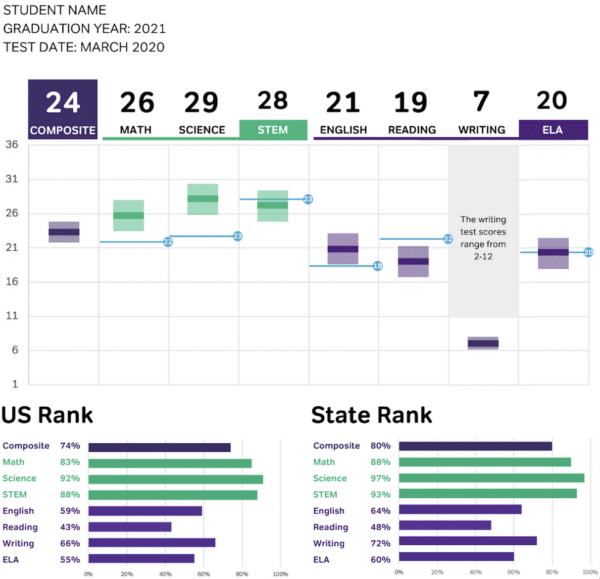
If you haven’t taken the ACT yet and you’re wondering where your practice test scores fall in the ACT distribution, you would first need to make sure that your raw score is converted to your scaled score for each subject area (except for the ACT Writing Test) as well as the composite score.
Then, you can use the below ACT percentile chart to match all five scores to their corresponding percentiles, based on the most recently-released data . (To score your essay and determine your ACT writing score percentile, check out this post about what makes a good ACT writing score .)
ACT Percentiles for Composite Score and Subscores
This ACT percentiles information is provided by ACT.org .
*This chart represents the cumulative percentages rather than percentile scores. If any of your scores correspond with 100, you would be at the 99th percentile.
What Is a Good ACT Percentile?
While it may be useful to know your ACT percentile as determined by the national or statewide distribution of scores, it’s not necessarily the best tool to determine what a good ACT percentile might be for you.
You may think that scoring at the 90th percentile nationally at least means that you have a competitive score for any school in the country (and to be fair, that would be the case for the vast majority of colleges and universities).
But for elite schools (where the average ACT score is around 33), scoring even at the 95th percentile might not be enough, especially if the rest of your application has some flaws. On the flip side, scoring below the 90th percentile mark could still allow you to be a great candidate at top state universities around the country.
This is because for pretty much any school in the U.S., a good ACT score percentile is anywhere in the middle 50% (25th percentile-75th percentile) of the score distribution of accepted students specifically at the schools you’re interested in —and that differs notably from school to school.
For example, at the prestigious University of Chicago , their 25th percentile score of accepted students is 34 while their 75th percentile is 35. Meanwhile, at the University of Texas-Austin , a phenomenal school in its own right, their middle 50% scores range from 27 to 33 (ACT test scores were not a required component for application to the Class of 2025).
While schools don’t release their own ACT score percentile charts, they do release the score range of their middle 50% of students. You can check out more score ranges of the top 100 U.S. universities in our post about ACT scores . Use this data to help you figure out the middle 50% ranges of your target schools—or better yet, the scores you need to go beyond the 75th percentile in order to maximize your chances of getting in.
How Do Colleges Use ACT Percentiles?
For college admissions offices, your ACT percentile is probably not as important as your ACT score. This is because the school’s ACT score range (as determined by the middle 50% at their school) is the information that admissions officers have handy; so, they don’t actually need to calculate your ACT percentile to see how your score falls into the middle 50% score range.
That being said, your national ACT percentile can provide an easy way of determining how you stack up to other students applying. Because applicants send in scores from the ACT and SAT, college admissions teams need some way to compare these scores. So for admissions officers who don’t have the ACT to SAT score conversion memorized (a.k.a. most of them!), they are likely to take notice of your percentile rank as well.
How to Use ACT Score Percentiles to Improve Your Score
If you have plans to retake the ACT , the ACT percentiles provide valuable perspective to help you be strategic with your test prep: how much you might need to study and which subject areas take higher priority.
Let’s take a look at our model score report once more:

With just a cursory look at the scores, you can see that this student is stronger at the STEM subjects than the ELA subjects. But the percentiles better show the magnitude of difference between these two areas and provide more of a sense of urgency to focus on ELA.
Although it is certainly fine to be stronger in one subject than another, you don’t want any one subject to drag down your score or percentile too much. Colleges would use this information to note that you are weak in certain areas.
Looking at this student’s scores alone can also make it seem like they might have to spend roughly the same amount of time studying for Reading and English. Or that the student might need to spend more time bringing up their Math score to be more on par with their Science score. When looking at the percentiles, however, you can see how the difference between the student’s performance on English and Reading is significant and that they should prioritize studying for Reading before other tests.
The state rank also provides some important perspective when it comes to prioritizing what to study for the ACT retake . If you’re only applying to public schools in your state, for example, your state percentile rank might give you a better sense of your competition than the national rank.
If your state rank is better than your national rank, you may be able to somewhat reduce the pressure to do well on a retake; conversely, if your state rank is worse than your national rank, you’d have to prepare yourself to hit the books.
In either case, you’d still want to dedicate as much time as possible to studying because the higher the ACT score, the more competitive of an applicant you’ll be.
Key Takeaway
Hopefully, after reading this post, you’ll have a better understanding of ACT percentiles and the scores you should aim for (if you haven’t taken the ACT yet). If you have, then hopefully you have a better sense of whether you’re on track with your current ACT percentile or if you need to aim higher.
If it’s the latter, we have plenty of resources to help you to improve your ACT score! Our blog is full of free resources, such as how to improve your ACT score by 10 points or how to structure your ACT study schedule .
For even more structured support and practice, you can check out our Magoosh ACT app , which is guaranteed to increase your score by 4 points .
Wherever you may be on your ACT journey, we at Magoosh wish you all the best!

As one of Magoosh’s Blog Editors, Anika relies on her nearly 20 years in education and youth leadership spaces to produce empowering, student-centered content across Magoosh’s blogs. Anika has a BA from Grinnell College and an MPP from Harvard University. Her experience includes serving two years as a Fulbright English Teaching Assistant in Malaysia, an SAT tutor for Kaplan, and currently, as the Executive Director of Youth Activism Project , a nonprofit that she co-founded when she was 12 years old. Anika’s work has been featured in The Washington Post , The Boston Globe , and Yahoo! Money . She has also spoken at panels and given presentations at New York University and Harvard University . If you’d like to keep up with Anika, you can check out her LinkedIn , Instagram , Twitter , and personal website .
View all posts
More from Magoosh

Leave a Reply Cancel reply
Your email address will not be published. Required fields are marked *
Exams Know-how
ACT Results and...
ACT Results and Scores: Score Pattern, Important Dates & ACT Scorecard

The ACT scores are widely accepted in the US and in 200 universities around the world for admissions to undergraduate courses. A good ACT score can not only ensure your admission to a top notch institution but also opens up the possibility of merit scholarships. This is exactly why you must understand the intricacies of ACT scoring pattern and result. The current article will help you understand how are ACT scores calculated, along with ACT scoring patterns, calculation methodology, validity and other important information pertaining to ACT results and scores in a simplified manner.
ACT Scoring Pattern: Understanding the ACT Composite & Writing Test Score
Let us begin by understanding the scoring pattern of the ACT exam.
The ACT format is distributed in four sections - English, Math, Reading and Science. Apart from these compulsory sections, students can also take the optional writing test.
It needs to be remembered that the ACT score calculation for the writing test and the multiple choice tests is different.
How is the ACT composite score calculated?
Many students get confused about calculating the ACT composite score, and understanding how to calculate ACT score . Therefore, a simple 3-step way to arrive at the ACT Composite score is being shared below:
Step 1: Calculating section wise raw scores
The first step is calculating the raw scores for each of the four sections of ACT. Each section contains multiple choice questions. For every correct response, 1 mark is awarded and no marks are deducted for incorrect answers.
Based on the number of correct answers, raw scores are estimated for each of the four sections. That means for a test of 40 questions, a student can score a maximum raw score of 40. Similarly, for a 60 questions test, 60 is scorable.
Let us look at the number of questions and the maximum raw score for each section through this ACT scoring chart:
Step 2 : Calculating the section wise scale score from raw scores
The raw scores for each section are converted to a scale of 1-36. Once converted, the four section scale scores (one per section) can be used to arrive at the composite score also known as the ACT composite score.
Suggested: Top 10 Colleges Accepting ACT!
To determine the scale scores for each section, score conversion tables are used.
Please Note the scale conversion tables differ for different forms of the exam.
Given below is the sample conversion table taken from the Free ACT practice test 2023-24. The scale score is estimated for each section using this conversion table.
Source: act.org
Step 3: Calculating the ACT composite score from section scale scores
Your overall ACT score or ACT composite score is calculated by taking an average of the scale scores of the four sections. This means English, Math, Reading, and Science scale scores are added and divided by 4. This average is rounded to the nearest whole number.
Suggested: What to Bring on ACT Test Day?
How Is the ACT writing test scored?
The optional writing test is scored differently than the multiple choice sections. In the ACT Writing Test, the students are asked to write an essay. This essay is then evaluated by 2 readers who score the essay on a scale of 1–6 for four different parameters. These are ideas and analysis, conventions, development & support, organization and language use. The final essay score will be provided on a scale of 2 (lowest score) to 12 (highest score).
Suggested: Everything You Need to Know about ACT Superscore!
ACT Score Percentile Distribution for Composite Score & Writing Test Score
The ACT scores can be viewed in the form of percentiles to compare your performance with other students. It is important to remember that for admissions, ACT scores are more important than percentiles because most colleges compare your composite scores to their own ACT score range.
Given below are ACT score percentiles distribution for both the composite score and the writing score for the year 2023-2024.
ACT Composite Score Percentile Distribution
Act writing score percentile distribution.
Suggested: Top 10 ACT Prep Resources!
What is a Good ACT Score for Getting Into a Top College or University?
Now that we have understood the scoring pattern for ACT, and the ACT score breakdown the next question is – what is a good enough ACT score ? Since the ACT score has two parts, the answer is also two-fold. Let us discuss them both below.
What Can Be Considered as a Good ACT Composite Score?
A good score depends on the college and university you will be applying to as an aspirant. The higher the score, the more liberty you have in picking the college of your choice .
For the year 2020, the average ACT Composite score was 20.6. In order to get into the top schools, your score should be way over the average.
For reference sake, lets a look at the ACT score distribution for top universities -
Source: Kaplan
What’s Considered a Good ACT Writing Score?
Although the writing test is optional, many students take this test to improve their chances of getting into a good college. Also, some colleges and universities recommend students to take the writing test including some reputed institutions like Stanford University , UC Berkeley , Yale University , Harvard University , Wellesley College , and many more.
Unlike the composite score, the writing score can vary between 2 and 12. The average ACT Writing score for the ACT 2019-2020 was 6.4 . A good ACT score would again depend on the institution but one should definitely aim at a score above the average. If we talk about whats the highest on the ACT? It is 36.
ACT Results: When are they released & how to check them?
The ACT scores are released within two to eight weeks after taking the test on the official website of ACT . To see your ACT scores, you must proceed with the ACT login on MyACT Accounts.
While the ACT Composite score for the multiple choice questions is declared within two weeks of the test, the writing scores are announced two weeks after the ACT Composite Scores are declared.
Remember: Writing test scores released separately, have no effect on the ACT composite score.
Important Dates of ACT Results 2023-24
Given below are the important dates related to ACT score results. Check them out to find out when the ACT scores are expected to be released.
ACT Scorecard: Interpreting the ACT Student Result Card
The ACT scoring card displays the scores for the 4 main sections along with the score of the optional writing exam. Given below is the ACT scoring card to help you interpret the ACT score percentiles and ACT score results:
Source: Act.org
The four sections have been categorized into two further sections called STEM and ELA.
The Purple Line Represents ACT College Readiness Benchmarks for each section, and also for the STEM and ELA scores.
If your score is above or equal to the Benchmark, it reflects that you have a 50% chance of obtaining a B or higher, or about a 75% chance of obtaining a C or higher in specific first-year college courses in the corresponding subject area. There is currently no Benchmark for writing.
Along with the composite score the detailed breakdown of marks is given under each section along with the writing test.
How to Use the ACT Results?
The ACT scores can be used in the following ways:
College Admissions & Course Placements
The ACT scores obtained are significant for college admission. Other factors such as academic record, plans, etc. are equally important. These factors help colleges select candidates who are the best fit for a given program in their college or university.
Your ACT score and photo are automatically sent to the institutions you reported when you registered for the test. Your institution will use this information along with your other information to help identify candidates who can benefit most from their programs.
Scholarships and Loans
For high ACT scores, several scholarships are granted to students. Colleges can use the results to assist scholarship & loan agencies in identifying qualified candidates, place students in the first-year courses, and help students develop an appropriate program of study. We at Yocket provide personalised counsel to ensure that you sail through the process safely.
Suggested: Know Everything ABout ACT Scholarships!
Validity of ACT Scores: How Long Can the ACT Scorecard be Used?
The ACT scores are valid for a period of 5 years from the day of the ACT exam. It means that if a candidate takes the ACT exam on 11th April 2023, their scores will be valid till 11th April 2028.
Retesting For ACT Exam: Why & When to Do It?
You can choose to retake the ACT exam more than once if you are convinced that the retest will improve your score. When you test more than one, ACT allows you to choose the test date and score you want to send to the colleges of your choice.
In the latest update, ACT allows students to combine scores from different test dates, it is known as Supercoring. Superscoring also allows students to combine the writing score of a writing test from one date with thesection score from another test.
Suggested: What After ACT Exam?
We hope this article helped you clarify any doubts that you may have regarding ACT scores and results. Our intent was to help you frame a strategy around what marks you need to target to get into your dream college.
About ACT Scores & Results
Do the colleges consider both composite and writing test scores for admissions?
While some colleges will only consider only the ACT composite scores, others may recommend students to take the writing test as well. Identify the colleges you are interested in and see what they recommend.
Does the ACT Writing Score affect the ACT Composite Score?
The Writing Test scores do not affect the composite scores. Both are calculated separately.
Where to check the ACT score?
The results are available on the official website of ACT and can be accessed by logging in with your MyACT account.
How can I send ACT scores & Results to Colleges & universities?
The scores are directly sent by ACT to the universities selected by the candidate at the time of registration for the ACT test. Students can also send their score cards directly to other universities.
Can correction be requested on the ACT Scorecard?
If you wish to report an error in information other than your scores, you can write to ACT for the same. This change can be made within three months of receiving your scores.
Can ACT scores be cancelled?
The ACT scorecard can be cancelled in case it is invalid. The candidate can also cancel the scorecard voluntarily upon request.
Can ACT be taken more than once?
Yes, you can attempt ACT more than once.
If you take the ACT test more than once, which of the ACT scorecards is considered as valid?
You can choose the scores you wish to send to the institutions in case of multiple ACT scorecards.
Is it possible to combine the score of tests taken on different dates?
Yes, with ACT Superscoring, students can combine the results from two different dates, the exam was taken.
What is the range and average of ACT Writing Test Score?
ACT Writing Test Score varies between 2 and 12. The average score was 6.5 for the year 2023-2024.
What is the range and average of ACT Composite Score?
ACT Composite score ranges between 1 and 36. The average composite score for 2023 is 21.

Sumeet Jain
Articles you might like
- Plan for College and Career
- Take the ACT
- School and District Assessment
- Career-Ready Solutions
- Students & Parents
- Open Search Form
- The ACT Test

- Registration
- Test Center Locator
- High School Codes Lookup
- Photo Submission Requirements
- Standby Testing
- Accommodations and Supports
- Free ACT Test Prep
- Official ACT Subject Guides
- The Official ACT Prep Guide
- ACT Kaplan Test Prep Suite
- Rescheduled Test Centers
- CAS Calculator FAQ
- College Codes Lookup
- How to Send Scores
- How Schools Use Scores
- When to Take the ACT
Understanding Your Scores
- Your Test Questions and Answers
Other ACT Services and Products
ACT Test Scores
Viewing, sending, and understanding your scores., act superscoring is available.
ACT provides an automatically calculated ACT Superscore to all students who have taken the ACT more than once from September 2016 to current day. Log in to MyACT to view and send scores.
Scores for the ACT Test
How can i see my scores.
When available, your scores are posted online and accessed using your MyACT account.
ACT Customer Support cannot provide your scores by phone, email, chat, or fax.
- Multiple choice scores are normally available two weeks after each national test date, but it can sometimes take up to eight weeks.
- Writing scores are normally available about two weeks after your multiple-choice scores.
If you took the writing test, your overall scores are not officially reported until your writing scores have been added. Viewing your scores online does not speed up reporting.
On select test dates, ACT performs equating activities to ensure that scores reported have a constant meaning across all test forms. During equating test dates, scores are available within 3-8 weeks.
For the 2023-2024 testing year, equating will be adminstered in October.
Score reporting dates
Scores are delivered over a window of time after the test date and are processed continuously during business hours. ACT is committed to providing your scores as quickly as possible but cannot guarantee a specific date for your scores to be reported.
Occasionally we are unable to post scores when expected. If yours are not available yet, it may be due to one of these issues:
- Answer documents from your test center arrived late or your test date was rescheduled.
- The "Matching Information" you provided on the answer document (name, date of birth, and Match Number) is not consistent with the Matching Information on your admission ticket . Scores cannot be reported until they can be accurately matched to the correct person. You provided incomplete or inaccurate test form information on the answer document, or the answer document has not cleared all other scoring accuracy checks.
- An irregularity is reported at your test center.
- You owe any registration fees.
If your scores are not yet available, while during the posted timeframe, ACT is unable to provide a status or timeline about a specific score.
Delivery timelines
ACT sends score report data to the recipients you provided during registration; these include your high school and any institutions with college codes you provided. ACT also provides your scores through your web account.
Your scores in MyACT
MyACT is mobile-accessible and friendly and all results can be accessed on a PC, tablet, or mobile device.
When you select score recipients, you’ll have the option of sending either score reports from the specific test event or you can choose to send your superscore.
You may print an unofficial copy of your ACT test score by using your browser’s print option. A PDF student report is currently unavailable.
Additional Services
Request a copy of the questions and answers.
Certain national test dates and centers give you the opportunity to order a copy of your questions, your answers, the answer key, and scoring instructions—plus the writing prompt, scoring rubric, and scores assigned to the optional writing test.
Request a Copy
Score Verification Service
You can ask ACT to verify your multiple-choice and/or your writing test scores up to 12 months after your test date. Please download the Request for Score Verification (PDF) .
You will need to complete the form, and enclose a check payable to ACT Customer Support for the applicable fee(s).
- For multiple-choice tests, ACT will verify that your responses were checked against the correct scoring key.
- For the writing test, ACT will verify that your essay was scored by two independent, qualified readers and by a third reader in the event that the two scores differed by more than one point in any domain. ACT will also verify that your essay was properly captured and displayed to readers. If errors are discovered during score verification, ACT will rescore your essay.
ACT will inform you by letter of the results of the score verification approximately three to five weeks after receiving your request.
If a scoring error is discovered, your scores will be changed and corrected reports will be released to you and all previous score report recipients at no charge. In addition, your score verification fee will be refunded.
Score Verification Request (PDF)
Correcting Errors in Your Score Report
Student errors
If, after you receive your score report, you find that you made a significant error in the information you supplied to us about yourself, or if you want to change your address, you may ask us to correct your record. Write to:
ACT Customer Support P.O. Box 414 Iowa City, IA 52243-0414 USA
Write within three months of receiving your score report. Enclose a photocopy or printed pdf of your Student Report describing the error and the change you are requesting.
There is no fee for making the correction, but you must pay the applicable fee for each corrected report you wish sent to a college, agency, or high school.
Other errors
If you think there is an error (on any information other than your test scores), write to ACT Customer Support—Score Reports at the above address within three months of receiving your score report. Enclose a photocopy or printed pdf of your Student Report describing the error and the change you are requesting.
If an error is our responsibility and requires you to retest, there will be no fee. If the error does not involve retesting, corrected score reports will be released to you and all previous score recipients at no charge.
If an error is not to be found to be made by ACT and you wish to send corrected reports, you must request and pay for Additional Score Reports.
Changing Score Recipients
If you need to change a score recipient, you have until Thursday noon after the regularly scheduled test date.
Need to send more scores?
In addition to the four institutions you selected upon registering, you can send your scores to others, even after you test. Requests are processed after all scores for your test option—the ACT or the ACT with writing—are ready.
Can scores be cancelled?
ACT reserves the right to cancel test scores when there is reason to believe the scores are invalid. See the Compromises/Disruptions in the Testing Process—Limitation of Remedies section of the ACT Terms and Conditions (PDF) for details.
Outside of state testing and district testing, you may request to cancel scores for a particular test date. Contact us online and we will provide you a form to complete and return to us. We will then permanently cancel that score record for the indicated test date and send cancellation notices to any score recipients.
What does it all mean?
There's a lot of information provided in the ACT score report.
Follow the link below to learn why we show individual reporting categories, how we arrived at your Composite score—and more!
National ranks
How do you compare?
Your national ranks tell you how your scores compare to those earned by recent high school graduates who took the ACT. Colleges use this information to help make admissions decisions, and scholarship agencies may base awards on it.
How schools use results
Your current and future schools want to learn more about you.
Just as you can use national ranks to get a sense of your strengths and weaknesses, so can your high school and potential colleges. A high rank in a content area may suggest a good chance of success in related college majors and careers. A low rank may indicate that you need to develop your skills more by taking additional coursework in that area. This information is helpful for you as well as your current and future schools.
Should I retest?
43% of ACT test takers chose to take the test more than once last year, and more than half of them improved their scores.
Why every point matters on the ACT test
Did you know improving by just a single test point can be worth thousands of dollars in financial aid for your college education? The ACT ® test is important to your future—and can open up new opportunities for college and career.
What scores are reported if I test more than once?
You determine which set of scores is sent to colleges or scholarship programs. We will release only the scores from the test date (month and year) and test location (e.g., National, State, School) you designate.
Can I combine scores from different test dates to create a new Composite score?
Yes - superscoring enables you to combine scores from different test dates.
Can I report only my writing scores or only my multiple-choice scores from a test date?
No. All scores from a test date will be reported together.
Can I combine my writing scores from one test date with my multiple-choice scores from another?
Yes - superscoring enables you to combine writing scores from one test date with multiple-choice scores from another test date.
Test Security Hotline
Cheating hurts everyone – if you see it, report it. You can make an anonymous report by using the Test Security Hotline . Discussing test content—including on social media—is not permitted. Students who don't do their own work put honest students at a disadvantage. If you suspect that someone is trying to take unfair advantages or encounter anything else out of the ordinary, please report it to ACT.
Compromises and disruptions
See ACT's Terms and Conditions for remedies available to examinees affected by compromises or disruptions in the testing process.
This action will open a new window. Do you want to proceed?
Welcome to ACT
If you are accessing this site from outside the United States, Puerto Rico, or U.S. Territories, please proceed to the non-U.S. version of our website.

COMMENTS
ACT Test Scores: Writing. Taking the ACT with writing will provide you and the schools to which you have ACT report scores with additional scores. You will receive a total of five scores for this test: a single subject-level writing score reported on a range of 2-12, and four domain scores, also 2-12, that are based on an analytic scoring rubric.
The following chart clarifies these differences between average ACT scores based on ethnicity from 2001 to 2022: Sources: NCES Average ACT Scores 1995-2014, 2016 Profile Report, 2017 Profile Report, 2018 Profile Report, 2020 Profile Report, 2021 Profile Report, 2022 Profile Report. Overall, the white, Asian, and two or more races subgroups have ...
Your Writing score is calculated by averaging your four domain scores, leading to a total ACT Writing score from 2-12. Next, the ACT will combine your essay score with your English and Reading sections score and average them to give you an English/Language Arts subscore between 1 and 36.
On June 28th, 2016, however, ACT, Inc. announced that starting in September of 2016, the Writing test would no longer be scored on a scale of 1-36, due to the confusion this had caused. This change to out-of-12 ACT Writing scores is still different from the pre-September 2015 ACT essay scoring, since that system relied on graders giving the ...
Your ACT score percentile is not like a grade out of 100; rather, it's a comparison between you and other students. For example, if you get in the 70th percentile, this means you scored the same as or higher than 70% of test takers. It doesn't mean you got exactly 70% of the test questions correct. (In fact, the ACT is tricky enough that if you ...
Scores range from 1-36, and the average ACT score in 2020 is 20.6. There are four separate sections, and the average score across these sections actually varies pretty substantially. The average score on the English Test is 19.9; the average score on the Mathematics Test is 20.2; the average score on the Reading Test is 21.2; the average score ...
The ACT Essay is scored from 1-6 in four categories by two graders. This gives you four scores from 2-12. You then receive a final ACT Essay score from 2-12 that is the average of these four scores. This is the score you will be reporting to colleges. For more detail on how the essay is scored, make sure you check out Rachel's article on ACT ...
The ACT® English language arts (ELA) score measures overall performance on the ACT English, reading, and writing tests. The ELA score weights the English, reading, and writing scores approximately equally and is therefore reported only for students who take all three tests. In this brief, we explain how the ELA score is calculated and present information for interpreting the score.
ACT Test Score Ranges. Understanding ACT score ranges and what they mean is crucial in evaluating your performance and determining where you stand in comparison to other test-takers. Each section has a test score range of 1-36: Below Average Score Range: 1-16. Average Score Range: 17-24. Above Average Score Range: 25-36.
ACT Writing scores are clustered around the mid-range. Readers gravitate toward giving 3s, 4s, and 5s. According to ACT's percentile data for the 2-12 reporting (see below), 65% of students' 2-12 scores will be 6s, 7s, or 8s. Average Domain Score. Cumulative Percent.
Every section except the ACT essay is scored on a scale of 1-36. 1 is the lowest score you can achieve on an individual section, while 36 is the highest score possible. Students also receive an ACT total score, called the composite score. This is the average of the scores received on the four required ACT sections.
Next, find the national rank in the column corresponding to that test. For example, the national rank for a Composite score of 22 is 69. This means that 69 percent of recent high school graduates who took the ACT achieved a Composite score of 22 or lower. Similarly, the national rank for a STEM score of 26 is 87.
The Math Section of the ACT has 60 questions on it and takes 60 minutes. To make scoring for the four main sections similar, your raw score is scaled to a 36-point scale, with 1 being the lowest possible score and 36 being the highest score possible. In the example score report the ACT provides, the student received a scaled Math score of 19:
The average ACT scores for the entire Ivy League are 31-35 for Math, 34-36 for English, and 33-35 for the composite ACT. That means that if your dream is to attend an Ivy-League school, you should work to get your ACT scores into the 30s, ideally in the super-high 34-36 range, especially for English and Reading.
The ACT essay score will appear on your score report on a scale from 2-12. ACT also reports an English Language Arts (ELA) score out of 36, which represents your overall performance on the English, reading, and writing tests, but this value is NOT included in your ACT Composite Score calculation. No ELA score is reported if you do not choose to ...
The following infographic might help you visualize the ACT score distribution: ACT scores and their corresponding percentiles tend to stay the same year to year. So, for example, scoring a 32+ typically means you did better than 97% of test-takers and scoring a 26 typically means that you did better than 82% of test-takers.
Average ACT Scores by State Graduating Class of 2022. The table below classifies states by the percent of ACT-tested high school graduates, including the average Composite score and percent meeting ACT College and Career Readiness Benchmarks by subject. The best practice is to compare states where the same or similar percentages of graduates ...
Optional Writing Test (not included in composite score) 1 essay prompt: 40: 1-12: 6.1: Writing skills Composite: 1-36: 19.5: ... 2005 distribution of ACT scores. The following chart shows, for each ACT score from 11 to 36, the corresponding ACT percentile and equivalent total SAT score or score range.
The ACT Essay Scoring System. The ACT essay is scored by two independent graders on a scale of 1-6 across four different domains: Ideas and Analysis, Development and Support, Organization, and Language Use and Conventions. The scores from each grader are added together for each domain, resulting in a domain score ranging from 2-12. These four ...
Math: For the Math section, a score of 25-31 is considered strong. However, students aiming for STEM programs at elite universities should target even higher scores. Reading: A Reading score in the range of 26-32 can be deemed as solid performance on this section. Science: In Science, a good ACT score falls between 24 and 30.
Part II: The Difference Between a 10 and a 12. If we asked the ACT what the difference is between a 10 and a 12 ACT essay, they would direct us to their scoring criteria (replicated in the table below) that describes the difference between the 5 and 6 essay scores in each domain. As you may already know, a total domain score of 12 comes from ...
The final essay score will be provided on a scale of 2 (lowest score) to 12 (highest score). Everything You Need to Know about ACT Superscore! ACT Score Percentile Distribution for Composite Score & Writing Test Score. The ACT scores can be viewed in the form of percentiles to compare your performance with other students.
ACT scores, college and career planning information: High school report: Your high school via online reporting: About 2-8 weeks after the test date: ACT scores, college and career planning information: College report: Each valid college code you listed and paid for when you registered or tested (up to six) Varies based on college and when ordered